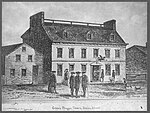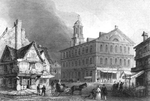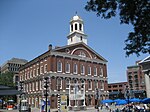Statues of James Michael Curley
1980 establishments in Massachusetts1980 sculpturesBronze sculptures in MassachusettsGovernment Center, BostonMassachusetts sculpture stubs ... and 4 more
Monuments and memorials in BostonOutdoor sculptures in BostonSculptures of men in MassachusettsStatues in Boston
Two statues of James Michael Curley (sometimes called James Michael Curley, Jr.) are installed at the intersection of Congress and North streets, in Boston, Massachusetts, United States. The bronze double portrait was created by Lloyd Lillie during 1979–1980, and dedicated on September 18, 1980. The standing figure measures approximately 77 x 30 x 80 in., and the seated statue measures approximately 55 x 38 x 43 in. The memorial was surveyed by the Smithsonian Institution's "Save Outdoor Sculpture!" program in 1993.
Excerpt from the Wikipedia article Statues of James Michael Curley (License: CC BY-SA 3.0, Authors).Statues of James Michael Curley
Congress Street, Boston
Geographical coordinates (GPS) Address Nearby Places Show on map
Geographical coordinates (GPS)
| Latitude | Longitude |
|---|---|
| N 42.360527777778 ° | E -71.057 ° |
Address
James Michael Curley Memorial (Curley Memorial)
Congress Street
02201 Boston
Massachusetts, United States
Open on Google Maps










